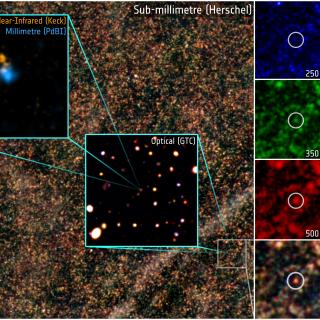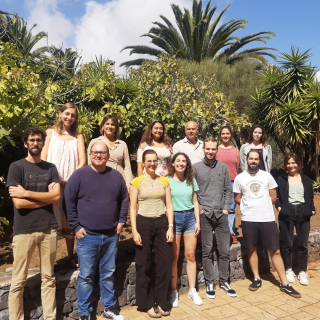Bibcode
Cava, A.; Rodighiero, G.; Pérez-Fournon, I.; Buitrago, F.; Trujillo, I.; Altieri, B.; Amblard, A.; Auld, R.; Bock, J.; Brisbin, D.; Burgarella, D.; Castro-Rodríguez, N.; Chanial, P.; Cirasuolo, M.; Clements, D. L.; Conselice, C. J.; Cooray, A.; Eales, S.; Elbaz, D.; Ferrero, P.; Franceschini, A.; Glenn, J.; Solares, E. A. González; Griffin, M.; Ibar, E.; Ivison, R. J.; Marchetti, L.; Morrison, G. E.; Mortier, A. M. J.; Oliver, S. J.; Page, M. J.; Papageorgiou, A.; Pearson, C. P.; Pohlen, M.; Rawlings, J. I.; Raymond, G.; Rigopoulou, D.; Roseboom, I. G.; Rowan-Robinson, M.; Scott, D.; Seymour, N.; Smith, A. J.; Symeonidis, M.; Tugwell, K. E.; Vaccari, M.; Valtchanov, I.; Vieira, J. D.; Vigroux, L.; Wang, L.; Wright, G.
Referencia bibliográfica
Monthly Notices of the Royal Astronomical Society: Letters, Volume 409, Issue 1, pp. L19-L24.
Fecha de publicación:
11
2010
Número de citas
15
Número de citas referidas
14
Descripción
We have analysed the rest-frame far-infrared properties of a sample of
massive (M* > 1011Msolar) galaxies
at 2 <~ z <~ 3 in the Great Observatories Origins Deep
Survey-North (GOODS-N) field using the Spectral and Photometric Imaging
Receiver (SPIRE) instrument aboard the Herschel Space Observatory. To
conduct this analysis we take advantage of the data from the Herschel
Multi-tiered Extragalactic Survey (HerMES) key programme. The sample
comprises 45 massive galaxies with structural parameters characterized
with HST NICMOS-3. We study detections at submm Herschel bands, together
with Spitzer 24-μm data, as a function of the morphological type,
mass and size. We find that 26/45 sources are detected at MIPS 24 μm
and 15/45 (all MIPS 24-μm detections) are detected at SPIRE 250
μm, with disc-like galaxies more easily detected. We derive star
formation rates (SFRs) and specific star formation rates (sSFRs) by
fitting the spectral energy distribution of our sources, taking into
account non-detections for SPIRE and systematic effects for MIPS derived
quantities. We find that the mean SFR for the spheroidal galaxies
(~50-100Msolaryr-1) is substantially (a factor ~3)
lower than the mean value presented by disc-like galaxies
(~250-300Msolaryr-1).
Proyectos relacionados

Formación y Evolución de Galaxias: Observaciones Infrarrojas y en otras Longitudes de Onda
Este grupo desarrolla varios proyectos extragalácticos en diferentes rangos del espectro electromagnético utilizando satélites y telescopios en tierra para estudiar la evolución cosmológica de las galaxias y el origen de la actividad nuclear en galaxias activas. En el aspecto instrumental, el grupo forma parte del consorcio internacional que ha
Ismael
Pérez Fournon

Huellas de la Formación de las Galaxias: Poblaciones estelares, Dinámica y Morfología
Bienvenida a la página web del g rupo de investigación Traces of Galaxy Formation. Somos un grupo de investigación amplio, diverso y muy activo cuyo objetivo principal es entender la formación de galaxias en el Universo de una manera lo más completa posible. Con el estudio detellado de las poblaciones estelares como bandera, estamos constantemente
Anna
Ferré Mateu